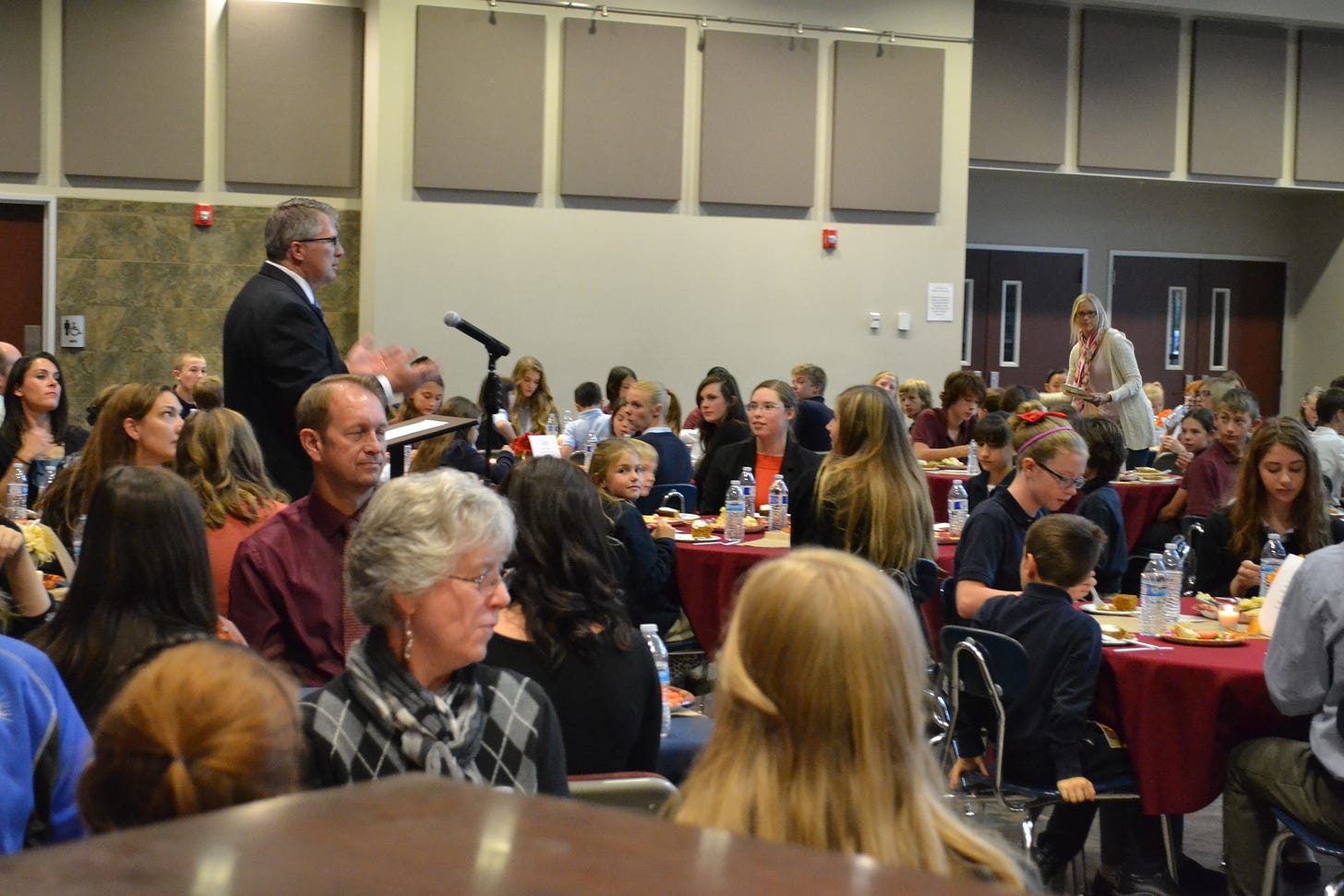The Supremacy of the Scriptures & the Fellowship of the Saints
(The following is my address from our first Reformation/All Saints' Day Feast.)
I’d like to tell you a Little Mr. Dunham story. Imagine when Mr. Dunham was a boy of about 5 – quite a bit shorter, quite a bit skinnier, probably still wearing a suit and tie. He grew up in the middle of the United States on a farm in rural Illinois. And he loved Thanksgiving.
He loved Thanksgiving because of the food – turkey and mashed potatoes and pumpkin pie, just like we’re having today; but he also loved Thanksgiving because he got to see family, sometimes family he didn’t even know he had! Yes, late on Thanksgiving morning, Little Mr. Dunham would stand at the door and excitedly wait for car after car to pull in the driveway and park, each one letting out dozens of cousins and aunts and uncles and grandparents who came for the feast at Little Mr. Dunham’s family’s farm.
Now, as many of you know, this is the first Feast of its kind at Petra. Not only is feasting referenced throughout the Scriptures, but Christian history places feasting as the central demonstration and expression of gratitude toward God and the joy that comes from celebrating his Providence – that is, his provision – in our lives. This is what Thanksgiving is all about! Today at our feast, however, we want to observe two significant days in the history of the Church – Reformation Day and All Saints’ Day – and I’d like to tell you a little about each of them.
Almost 500 years ago, on October 31, 1517, a troubled Catholic priest named Martin Luther nailed his famous 95 Theses (or statements) critiquing certain church practices to the church door at Wittenberg, Germany. The door of the Castle Church served as the official university bulletin board and was regularly used for this kind of announcement – in this case, a public discussion on the practice of indulgences, or paying money to purchase a “free pass” for one’s sins instead of repenting of them.
However, as there had been growing unrest among many church people over these and other church matters, when Luther’s criticisms were published by way of the newly invented printing press, the spark ignited a raging fire of debate about what the Bible says about salvation and quickly spread through many countries of Europe. This was the beginning of what we now call the Protestant Reformation.
All Saints' Day is a holy day that the Orthodox church traces back to church father John Chrysostom in the 4th century as a recognition of saints – many of whom were martyrs – celebrated on the first Sunday after Pentecost. Pope Boniface IV, who consecrated the Parthenon at Rome to Mary and the martyrs, initiated the practice in the Catholic church in 609 A.D. before Pope Gregory III officially established the holy day on November 1 in the mid-eighth century.
Historically, Catholic churches have thought of “saints” as those officially canonized or “made” saints by the church, but in the Orthodox church, as well as in many Protestant denominations today, All Saints’ Day is celebrated as a remembrance of departed Christians from any time and place – those whom Hebrews 12:1 calls a “great cloud of witnesses” surrounding the Church universal. Thus, All Saints’ Day is a day in which we honor faithful believers who have died, but also those by whom we are sitting even now! For as in one of the verses of the hymn that our choir will soon sing:
“O blest communion, fellowship divine!
We feebly struggle, they in glory shine
Yet all are one in thee, for all are thine.
Alleluia, alleluia!”
The supremacy of the Scriptures and the fellowship of the saints – this living truth and this “one in thee, for all are thine” reality – is what we celebrate today at our Reformation and All Saints Feast. Whether we are Orthodox or Catholic or Protestant, we can and choose to gather in unity at Petra to share this meal together. Why? Because we are together! We are part of God’s family because...
“We believe in one God, the Father Almighty, Maker of heaven and earth, of all things visible and invisible. And in one Lord Jesus Christ, the only-begotten Son of God, begotten of His Father before all worlds, God of God, Light of Light, very God of very God, begotten, not made, being of one substance with the Father by whom all things were made; who for us and for our salvation came down from heaven, and was incarnate by the Holy Spirit of the virgin Mary, and was made man; and was crucified also for us under Pontius Pilate; He suffered and was buried; and the third day He rose again according to the Scriptures, and ascended into heaven, and is seated at the right hand of the Father; and He shall come again, with glory, to judge both the living and the dead; whose kingdom shall have no end. And we believe in the Holy Spirit, the Lord and giver of life, Who proceeds from the Father and the Son; Who with the Father and the Son together is worshiped and glorified; Who spoke by the prophets; and we believe in one holy catholic and apostolic church; we acknowledge one baptism for the remission of sins; And we look for the resurrection of the dead, and the life of the world to come. Amen.”
These truths (and our unity as saints surrounding them) are what we celebrate today. Thanks be to God!




